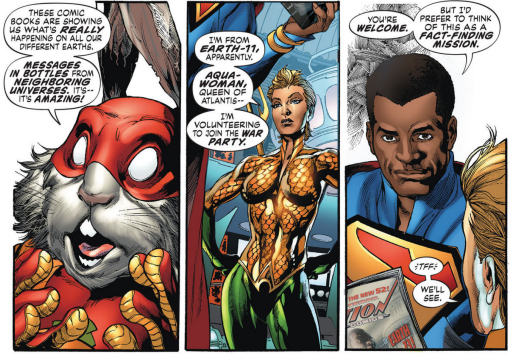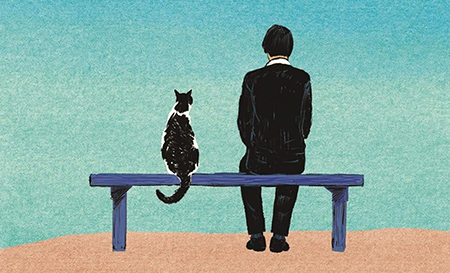
The Multiversity (Written by Grant Morrison, With Each Issue Illustrated By a Different Team)

As I've said time and again, you need to go into The Multiversity knowing as little as possible because your own lack of knowledge starting out is part of the story, so I don't want to say much more than "It's an interesting look into fiction as alternate realities, could have focused a little more on the story, and Morrison's habit of coming up with banger ideas only for the whole thing to culminate in a wimpy ending strikes again." It's hard to say if the ending is a setup for a Multiversity II, or if the big baddy is supposed to be what I think it is and an indication that, for these characters, the battle will never end.
"Pax Americana" is what made me wonder if I don't dislike Frank Quitely's artwork so much as his linework because his panel layouts in that issue are incredible... and then the humans occupying them have that crumbly, wobbly, "inked with a vibrating pen" look to them.
Rating: 



Attack of the Friday Monsters: A Tokyo Tale (3DS)

Oh hey, it's been a while since we've seen "Cute little story, shame about the game."
You play as the son of a dry cleaner whose family just moved to a small town where monsters are said to attack every Friday, but it turns out it's only a local television network filming a kaiju show, but as the game progresses the lines between childhood imagination and reality get blurrier and blurrier. The actual game, though, alternates between running around and collecting junk up off the ground that turns into cards when you collect a set, talking to people, and playing a really insubstantial card game. I'm pretty sure there was only one puzzle in the whole game, that being how to get the bullies out of the road that one time.
For the card game, both players lay down five cards each marked with Rock, Paper, or Scissors, the game will tell you who's winning overall and if a couple cards are winning, losing, or in a draw, then each of you get to switch two cards. There's a little bit of strategy involved, like if the game tells you your scissors card is beating your opponent's card that means they have paper, and you have to decide if you want to switch out one of your own cards that's losing or gamble on the assumption that your opponent is going to move a rock into that slot, but most of the time I feel like the game could have been swapped out for a coin flip.
Rating: 

If Cats Disappeared From the World (Written by Genki Kawamura, Translated by Eric Selland)

When a young postman (while writing this I went back trying to figure out what his name was because I couldn't remember. Turns out he never was named) learns he's going to die of a brain tumor, the Devil appears to him and offers him a deal: he can prolong his life by erasing one thing from the world for each extra day of life, with the added bonus that he gets to use it one more time before it vanishes. And when I say "one thing" I mean all of that thing. Yeah, when you take a close look at it it doesn't make a whole lot of sense, like it doesn't seem worth it to erase every movie on Earth for just one day of life. I'd also like to know if taking this deal condemns you to Hell when you die, but maybe I'm missing the forest for the trees. Plus the book was originally written in Japanese and the Japanese might not think of Hell and deals the Devil the same way Americans do, and this Devil (or "Aloha" as the protagonist calls him, due to his love of tacky Hawaiian shirts) seems more interested in enlightening mortals than claiming their souls.
You can argue the book could have done a better job at exploring the morality of erasing everybody's cell phones for your own benefit, but at the same time it's a story for a different book. Rather, If Cats... is about the balance of life; to gain something you must give something up, and if you want to lose the bad, you must also give up the good. The first thing Aloha offers to erase is phones which the protagonist accepts in a heartbeat believing phones to just be a nuisance. And yes, phones have given us brain rot, but they also give us communication; you can't have one without the other so do you want both, or neither? Maybe you think the brain rot is more detrimental than the communication is helpful, so the loss of phones would be a net positive. Things come to a head when Aloha offers to erase cats from the world and the protagonist has to finally answer the question of it he wants live without the things that make life worth living.
In Japanese there's the concept of "mono no aware," the sad beauty in knowing that something's existence is only temporary (sometimes I wonder if this is why Nintendo cares so little about game preservation because everything returns to the void eventually, but it's probably just because they're indifferent assholes). It's often use to explain how life is all the more precious because it's finite, a theme that pops up in the Final Fantasy series a lot, especially in Final Fantasy III (the actual FFIII, not the original localization of VI). The great Magus Noah imbued his three disciples with different gifts before his own death: Doga got Noah's great magical power, Unei got control over the dream world, and Xande received mortality. Xande was offended by his gift which kicked off the game's events, but Unei says it was the greatest of the three.
Oh, and if anyone is wondering if the protagonist erases cats from the world: He does not. At first he thinks he did without realizing, panics, and his fear over what he might have done helps him accept his death and refuse Aloha's offer.
Rating: 


